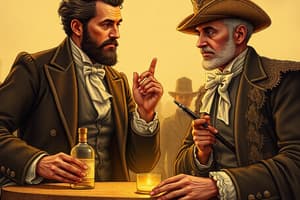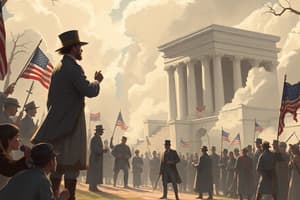Podcast
Questions and Answers
What was the corrupt bargain in the election of 1824?
What was the corrupt bargain in the election of 1824?
- Henry Clay convinced the House to elect John Quincy Adams in exchange for a position. (correct)
- John Quincy Adams was elected after securing a majority of electoral votes.
- The election was decided by the Senate.
- Andrew Jackson was elected with the majority of votes.
Who won the election of 1828?
Who won the election of 1828?
- Henry Clay
- Martin Van Buren
- John Quincy Adams
- Andrew Jackson (correct)
What does the spoils system refer to?
What does the spoils system refer to?
The system of employing and promoting civil servants who are friends and supporters of the group in power.
What was the Tariff of Abominations?
What was the Tariff of Abominations?
What was the main argument of The South Carolina Exposition?
What was the main argument of The South Carolina Exposition?
Who was John C. Calhoun?
Who was John C. Calhoun?
The Nullification Crisis involved South Carolina's threat to ______.
The Nullification Crisis involved South Carolina's threat to ______.
What did the Whig Party stand for?
What did the Whig Party stand for?
Who was Martin Van Buren?
Who was Martin Van Buren?
What was the purpose of the Specie Circular?
What was the purpose of the Specie Circular?
What period is known as the Era of Good Feelings?
What period is known as the Era of Good Feelings?
What significant treaty did John Quincy Adams help draft?
What significant treaty did John Quincy Adams help draft?
What does the term Old Hickory refer to?
What does the term Old Hickory refer to?
Who was Denmark Vesey?
Who was Denmark Vesey?
What was the Compromise Tariff of 1833?
What was the Compromise Tariff of 1833?
What was the Force Bill?
What was the Force Bill?
What was the Indian Removal Act of 1830?
What was the Indian Removal Act of 1830?
What is the Trail of Tears?
What is the Trail of Tears?
What was the Bureau of Indian Affairs?
What was the Bureau of Indian Affairs?
Who led the Black Hawk War?
Who led the Black Hawk War?
What was the Seminole War?
What was the Seminole War?
What was the Bank of the United States?
What was the Bank of the United States?
Who was Nicholas Biddle?
Who was Nicholas Biddle?
What significant event took place during the Election of 1832?
What significant event took place during the Election of 1832?
What was the significance of Biddle's Panic?
What was the significance of Biddle's Panic?
What are pet banks?
What are pet banks?
What were wildcat banks?
What were wildcat banks?
What caused the Panic of 1819?
What caused the Panic of 1819?
What triggered the Panic of 1837?
What triggered the Panic of 1837?
What did the Divorce Bill accomplish?
What did the Divorce Bill accomplish?
What was the Erie Canal?
What was the Erie Canal?
What was the Missouri Compromise?
What was the Missouri Compromise?
What did John Marshall contribute to U.S. law?
What did John Marshall contribute to U.S. law?
What was the Treaty of 1818?
What was the Treaty of 1818?
Flashcards are hidden until you start studying
Study Notes
Key Events in Early American Politics
- Corrupt Bargain: In 1824, the election was decided by the House of Representatives when no candidate secured a majority. John Quincy Adams was elected over Andrew Jackson, aided by Henry Clay's influence.
- Election of 1828: Andrew Jackson won decisively against John Quincy Adams, with 178 electoral votes versus 83, marking a significant victory for the emerging national party system.
Policy and Political Systems
- Spoils System: Implemented by Andrew Jackson, this system rewarded political supporters with government positions, prioritizing loyalty over merit.
- Tariff of Abominations: A protective tariff enacted in 1828 that favored Northern manufacturing, leading to significant resentment in the Southern states.
- The South Carolina Exposition: Authored anonymously by John C. Calhoun, advocating for the nullification of federal laws deemed unconstitutional.
John C. Calhoun and States’ Rights
- John C. Calhoun: Vice President under Jackson, prominent advocate for slavery and states' rights; published the South Carolina Exposition defending the idea of nullification.
- Nullification Crisis: Triggered by Southern opposition to the Tariff of Abominations, leading South Carolina to threaten secession; Jackson responded with the Force Bill to assert federal authority.
Political Parties and Elections
- Whig Party: Formed in the 1830s to oppose Jackson, standing for protective tariffs, national banking, and infrastructure improvements.
- Election of 1832: Andrew Jackson faced off against Henry Clay, winning re-election. This marked the first occurrence of a third party, the Anti-Masonic Party, engaging in a significant election.
Economic Policies and Crises
- Specie Circular: Issued in 1836 to curb land speculation, requiring payment for public lands in gold or silver; this led to a severe drop in land sales and contributed to the Panic of 1837.
- Panic of 1837: Economic downturn resulting from Jackson's withdrawal of federal funds from the Bank of the U.S., leading to many bank failures and widespread unemployment.
Native American Policies
- Indian Removal Act (1830): Authorized negotiations for land exchanges with Native American tribes east of the Mississippi, leading to forced migrations.
- Trail of Tears: The forced relocation of the Cherokee, resulting in over 4,000 deaths during the arduous journey to designated Indian Territory.
Key Figures in American Expansion
- Stephen Austin: Referred to as the "Father of Texas," led the settlement of Americans in Texas.
- Santa Anna: Mexican dictator captured at the Battle of San Jacinto, resulting in Texas's independence.
- Davy Crockett: Bear-hunting frontiersman known for his role at the Alamo; executed by Santa Anna following the battle.
National Infrastructure and Culture
- Erie Canal: Completed in 1825, this canal revolutionized transportation and trade, connecting the Atlantic Ocean with the Great Lakes.
- Cumberland Road: The first major federally funded road, facilitating westward expansion and commerce.
- American System: Proposed by Henry Clay to boost the economy through tariffs, a national bank, and federal funding for internal improvements.
Judicial and Legislative Milestones
- Missouri Compromise: Established a balance between slave and free states by admitting Maine and Missouri in 1820 and drawing a line across the Louisiana Territory.
- John Marshall: Chief Justice whose rulings established key principles of federal power and judicial review.
Significant Wars and Conflicts
- Black Hawk War: Conflict between U.S. forces and Native tribes in the 1830s, resulting in the removal of the Sauk and Fox tribes from Illinois.
- Seminole War: Armed resistance in Florida against the U.S. government’s efforts to remove the Seminole Indians.
These notes encapsulate critical events and concepts from early American history, highlighting their impact on the nation’s development.
Studying That Suits You
Use AI to generate personalized quizzes and flashcards to suit your learning preferences.




